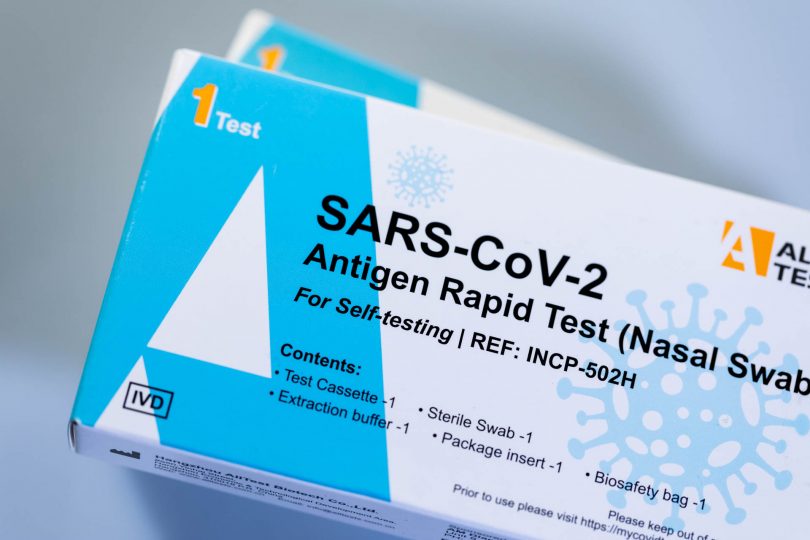
Rapid Antigen Test (RAT) are hard to access across the community. Photo: Michelle Kroll.
We all want Canberra to be a healthy, safe place for everyone, a city where public health decisions are made based on scientific evidence and prioritise the needs of those most at risk.
But our Prime Minister is making decisions that encourage competition between state and territory governments, retailers like pharmacies and supermarkets and his own government to access rapid antigen tests (RATs). Accessing RATs right now is almost impossible, even for the ACT Government.
In Canberra, there are 80,000 people with a disability, 50,000 people aged 65 years or older and 50,000 unpaid carers supporting their loved ones who are elderly or have a disability. Our prison system houses hundreds of people, including the potential for children as young as 10 years old in our youth detention centre.
Thousands of Canberrans are in surgical, cancer, mental health, and other wards in our hospitals. They are at most risk of poor health outcomes from COVID-19.
People accessing disability or aged care support in the home face the very real risk of being hospitalised because their basic health needs cannot be met.
We’re facing extraordinary rates of community transmission, resulting in much-needed disability support providers losing up to 30 per cent of their workforce to quarantine. This extends to workers in aged care facilities and healthcare services. Waiting for test results means people are going without the support they need to live with dignity.
Think about how it would feel to lie in bed for hours, wondering if anyone is coming to help with toileting or showering or feeding you. Or what it means to be unable to continue therapies that keep your body and mind functional, knowing that without them you will need clinical inpatient care to get back to a state of health where you can live at home again.
Or needing to go to Canberra Hospital for chemotherapy and hoping that the nursing staff providing your health care are COVID-free.
RATs keep people safe, healthy and able to everyday support services. Trials in the Alexander Maconochie Centre have demonstrated we can prevent transmission of COVID-19 in places that have high exposure risk through routine testing.
In Canberra’s health services, RATs have got workers out of quarantine, back to work safely and reduced pressure on our healthcare workforce. One of the ACT’s largest disability support providers prevented the virus spreading from COVID positive workers to the people they support through RAT screening.
We can’t adopt the ‘personal responsibility’ approach our Prime Minister wants us to when we don’t have access to the resources. Instead, we need to look at our community responsibility and prioritise access to RATs for those most in need to keep Canberra safe and healthy.
Scott Morrison says the Commonwealth will provide RATs for residential aged care workers and disability support workers in Supported Independent Living. He’ll pay half the cost of RATs for school staff if the ACT Government wants to use them for surveillance testing, although there’s no public health evidence on which to base this decision.
But he will contribute nothing for disability or aged care workers who deliver high-risk personal care services to people at home. He won’t help the ACT Government access supplies, even for schools where the Commonwealth will meet half the cost. Paying half the bill is cheap when there’s none to buy.
While it’s great to have more time as a family, remote learning is no replacement for face-to-face teaching. Young people are experiencing more psychological distress and following the August lockdown, 80 per cent of young Canberrans said they felt socially isolated.
I want my kids to return to face-to-face school in February and be safe from COVID. But not at the expense of someone with a disability having access to support workers who help them function on a daily basis. Not if it means emergency services workers, nurses and intensive care unit specialists are working double shifts because of workforce impacts as more people enter quarantine.
I cannot support Commonwealth Government public health decisions that don’t put the needs of those who are most at risk at the top of the priority list. I will not support decisions made on a whim without expert advice and evidence. To do so would mean people we love pay the price with their lives.
If the Prime Minister wants to lead this country, it’s well past time for him to do his job. All I’m seeing right now is a marketing manager who couldn’t give a rat’s about any of us.
Emma Davidson is the ACT Minister for Mental Health, Minister for Disability, Minister for Justice Health, and Assistant Minister for Seniors and Veterans and Families and Community Services. Her responsibilities include carers, youth justice, and community recovery from COVID.





















